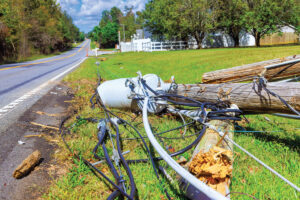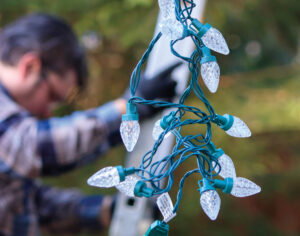 Farmers are the backbone of America, supplying essential food and resources that sustain our daily lives. The U.S. Bureau of Labor Statistics lists agriculture as one of the most dangerous U.S. sectors, with harvest season being particularly hazardous. National Farm Safety and Health Week (Sept. 15-21) reminds farmers to prioritize safety.
Farmers are the backbone of America, supplying essential food and resources that sustain our daily lives. The U.S. Bureau of Labor Statistics lists agriculture as one of the most dangerous U.S. sectors, with harvest season being particularly hazardous. National Farm Safety and Health Week (Sept. 15-21) reminds farmers to prioritize safety.
Safety starts with preparation. Be prepared for potential emergencies before the season begins. Have a safety plan, and make sure that farm workers and family members are aware of it.
Look out for power lines
The increasing size of farm equipment allow operators to come perilously close to overhead power lines. It’s vital to keep equipment away from them — 10 feet away, at minimum.
Injuries and fatalities are more likely to occur during harvest. Combines and equipment loaded onto trailers can hit power lines and cause electrocution, as can raising the bed of a truck to unload. The most common equipment involved in power line accidents are portable grain augers, oversized wagons and large combines.
The leading cause of electrocution on the farm is an auger hitting a power line when moved. Portable augers being maneuvered by hand around bins have caused the death of many workers who became the path to ground for electricity when the top of the auger came into contact with an overhead line.
Farmers should always use a spotter when moving tall loads and set extensions to the lowest setting to further prevent contact with overhead lines. Inspect equipment for transport height and determine clearance for any power lines under which the equipment must pass. Never attempt to move a power line out of the way or raise it for clearance.
Have an emergency plan
Make sure everyone knows what to do if accidental contact is made with an overhead power line. It’s almost always best to stay in the cab, call 911 for help, and wait until the utility arrives to make sure the power is cut off.
If the power line is energized and you step outside, your body becomes the path to ground, resulting in electrocution. If a power line is on the ground, there is potential for the area nearby to be energized. Stay inside the vehicle unless there’s a fire.
In that case, the proper action is to jump clear of the equipment with both feet together and land without touching the equipment and ground at the same time. Continue to shuffle or hop to safety, keeping both feet together.
Overhead wires are not the only electrical contact that can result in a serious incident. Pole guy wires are grounded, but when one is broken, it can cause an electric current disruption. This can make those neutral wires dangerous. If you hit a guy wire and break it, call the utility to fix it. Do not do it yourself. When dealing with electrical poles and wires, always call the electric utility.
Other tips
- Do not use metal poles when breaking up bridged grain inside and around bins.
- Always hire qualified electricians for any electrical issues.
- Do not use equipment with frayed cables.
- Make sure outdoor outlets are equipped with ground fault circuit interrupters.
- Wear proper safety gear such as head protection, work gloves, protective footwear (to help prevent slips and falls) and eye protection.
Harvest season often means putting in long hours, which can make it difficult to stay alert and on the lookout for potential hazards. Take regular breaks, stay hydrated and be mindful of your own limits to ensure a safe and plentiful harvest. For more information, visit SafeElectricity.org.









